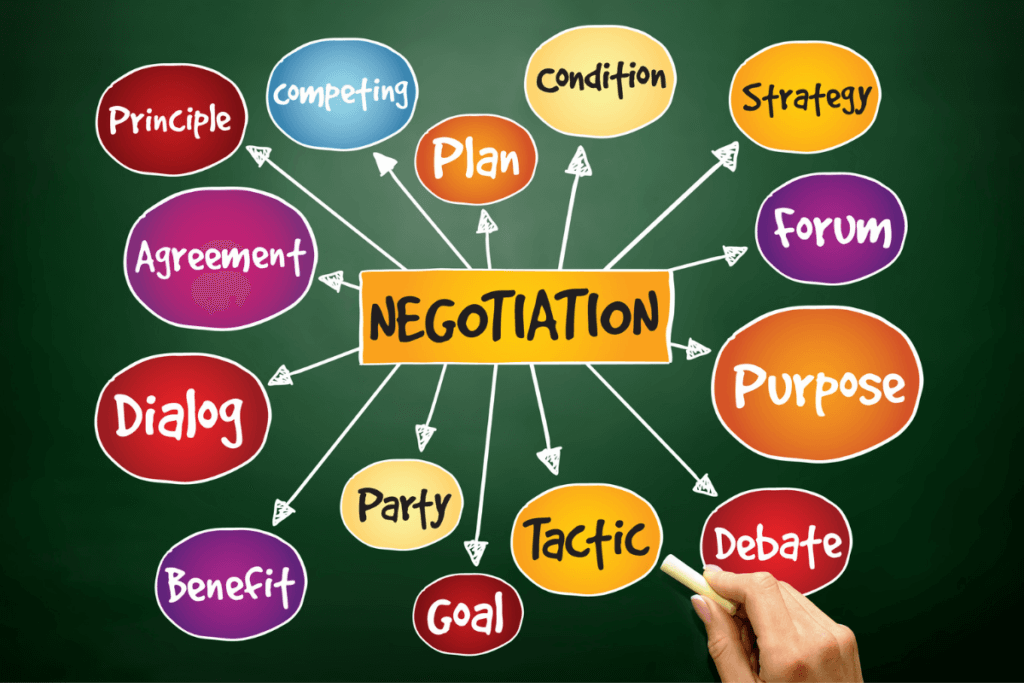
Yesterday morning, when I asked my daughter to complete her E-content questions, she had a condition, “I will do it after you allow me to play on the mobile for 15 minutes.”
Wow…how cool is that.
She is all of 9 years but has a knack of negotiation we all could learn from. At least I could. Because she always has an alternative to suggest, doesn’t tire, and above all, enjoys the whole process.
Which set me thinking once again.
Our whole life is spent dealing and preparing for negotiations.
Because negotiation is merely resolution of conflict that may occur in the workplace, home, public places, or anywhere there are two or more people assembled.
But the moment we hear the term conflict, we conjure an image of a war zone with soldiers marching, tanks creating havoc in their path, people looking down from broken window panes and copious amounts of grease and dust smeared on everything you can lay your eyes on.
Conflict is nothing more than difference of opinion and hence very common.
Yes, war zones are places of conflict. But so are the places where people live, go to work or assemble for recreation.
If you start looking at negotiation positively, as an opportunity to engage with people who hold opinions different from ours, everyone’s life would be much smoother. Fundamentally negotiation is all about human interaction. About how we engage with people who have a worldview different from us. About how we can achieve better agreement, whether on paper or verbal.
Negotiation expert Deepak Malhotra says
Negotiation principles are more important than negotiation tactics. Because tactics can vary from one situation to another but the underlying principles remain the same.
The incorrect approach
This is how people generally approach a negotiation:
- I know what I want
- I know why I want it
- I have 4-5 arguments or justification in support
- 2-3 of those will be effective
- I will get what I want
Most of us take this approach, but when you read this list, something must have sounded off. What if I don’t get what I want? Or rather, how can I be so sure of getting my ask?
That’s why this is a completely wrong approach to take to the negotiation table.
What’s the alternative?
Like everything else you need to think of the other person rather than only about yourself. You need to think about the constraints and reservations of the person you are negotiating with. You should think about how you are going to help him ensure that you get your ask.
Some of the questions you can try to answer are:
- Is it possible for them to meet your demands? There might be conditions out of their control. You should be aware of them, and probably with a suggestion for a way out.
- Does the other person like you enough to fight for you? Believe me, you want them on your side.
- Are you justifying your ask? Try to think it this way: If a similar ask was turned down a few days ago, why should yours be fulfilled?
- Do you use a language that is empathetic and non-aggressive? Because aggression is one thing that is not going to help you at all. The more you try to convince, the less likeable you become and less likely you are to get what you are asking for.
Be prepared for the worst
Most people go to the negotiating table assuming that they will get their ask. Unfortunately, that is not always the case. So, you should be prepared for when you don’t get your ask. And the moment you start preparing for it you will start asking yourself why you should get what you’re asking for.
Set clear boundaries
Clarity is essential so that the negotiation does not collapse. The other person should understand what is unacceptable to you. Even before you start, lay down the conditions X, Y and Z, which are unacceptable to you. And make it clear that you will walk out if any of these happen.
And if the other party has some conditions, consider and respect them.
How much to reveal
If possible, be honest. It increases your chances of a successful negotiation. Most of the times you have a list of options. If not A then B else C.
Say, if you don’t get a pay raise maybe you will settle for more work from home? Ok, not work from home; we have had enough of that during the lockdown, but maybe more vacation time? Or a permission to pursue higher education?
Be clear of your priorities and then be honest about it with the person on the other side of the table. When you are honest with them and share your priorities, they actually root for you and try to fulfill your ask.
However, in a high-risk scenario where you distrust someone, transparency and honesty might not be a very good idea. You might need to hold back some information if you feel that they can use it against you later.
Do you need a mediator?
If the conflict seems complex and you feel you cannot negotiate on your own, do consider a mediator. Don’t think that mediators are used only for complex business deals or international negotiations.
A mediator can help bring new ideas to the table, which you might have missed out on because you are too close to the situation. The mediator should be able to educate you on how to approach the process of negotiation. Or, they might hold a leverage over the other party and help you negotiate a better deal.
Keep in mind that the mediator can be appointed only with the consent of both parties. So if you are trying to negotiate a business deal gone sour, you can have someone who knows both the parties as a mediator. If it’s a family matter that has to be negotiated, a person respected by both the parties can act as the mediator.
Final thoughts
Before sitting on the negotiating table, whether formally or informally, you must plan and strategize. Know the people who will be there and think about how much they know you. Because everyone has difficulty trusting people they don’t know. And if they don’t trust you, you will find it that much harder to agree to your worldview.
Happy negotiating!!
And if you have any doubts, shoot them in comments.
The post was first published on June 24, 2021.

